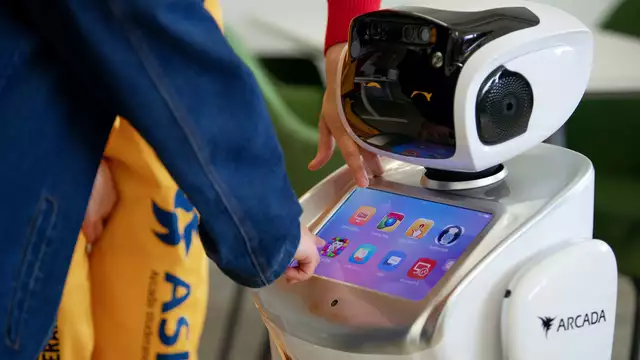
"Come on kids, let’s play”, says the robot – new Arcada project focuses on child-robot interaction
Published: 28.02.2023 / Artificial intelligence
Already ten years ago Arcada set off its research in AI (artificial intelligence) and pioneered the field with a master's programme in Big Data Analytics. In recent years, Arcada further sharpened its focus in AI research by specifically focusing on ethical issues related to new technologies and on the interaction between humans and robots. So far, dentistry, elderly care, rehabilitation, and preventive health care have benefited from this research – and now the focus is set on child-robot interaction.
Arcada is initiating a research project on how humanoid robots and technology can be ethically and sustainably integrated as part of the everyday life of early childhood education. The aim is to develop models and technical solutions for how algorithms and robots can support children's learning and to ease the staff’s workload. This could mean that the robot interacts with the children in a singing session, or help with routine tasks to enable the staff to focus more on the children.
“The research does not aim to replace human contact and interaction in daycare centres, but on the contrary to support communication and learning in an ethical and sustainable way, and to give children an equal opportunity to get in touch with new technology, by creating a good foundation for learning”, says Henrika Franck, Dean of Arcada’s Graduate School and Research.
Significant funding enables the research project
The project is made possible thanks to significant funding comprising €500,000 from the Ministry of Education and Culture and €125,000 from Stiftelsen Brita Maria Renlunds minne. The first step of the project is to understand how digital solutions can support everyday life in early childhood education, and then to develop these solutions. The solutions will then be tested in practice, through a pilot collaboration with Stiftelsen Bensow.
“It will be exciting and interesting to see how interaction between children and robots can complement and support our activities. We see the project as a new form of learning environment where language support, problem solving, intellectual experiments and enhanced digital literacy can be actualised”, says Andréa Sjöström, CEO at Stiftelsen Bensow's company Lyan, which operates early childhood education in two units, the Lyan Day Care Centre and the Grytet Day Care Centre in Kauniainen.
The donation from Stiftelsen Brita Maria Renlunds minne enables the infrastructure for the project, i.e. two humanoid robots intended specifically for research in children’s interaction with robots. The robots will be central to both the research and future teaching, and at Stiftelsen Brita Maria Renlunds minne there is an interest in how people in social services will view the ethical issues involved in the interaction between robots and children.
“Through the funding to Arcada, we want to support the opportunity for social services students to encounter, and also influence, the development of technology. Future professionals in early childhood education can find completely new angles in how robots can be used in the industry, and it will be exciting to follow this development”, says Birgitta Forsström, CEO at Stiftelsen Brita Maria Renlunds minne.
Interdisciplinary science for the Fenno-Swedish context
Research in robotics and humans is topical at Arcada as well as internationally, while the national knowledge needs to be strengthened. To drive the national development forward, the linguistic and cultural specificity of the Fenno-Swedish context will be central to this interdisciplinary collaboration.
“As a Swedish-language higher education institution responsible for training social services workers qualified to work in early childhood education and IT engineers with specialist knowledge of robotics, we now have a unique opportunity to contribute to the national knowledge of AI. The interdisciplinary collaboration enables a dialogue between the developers, the children and the early childhood education staff, and this way we contribute to AI research, especially in the Fenno-Swedish context”, says Franck.
Read more: